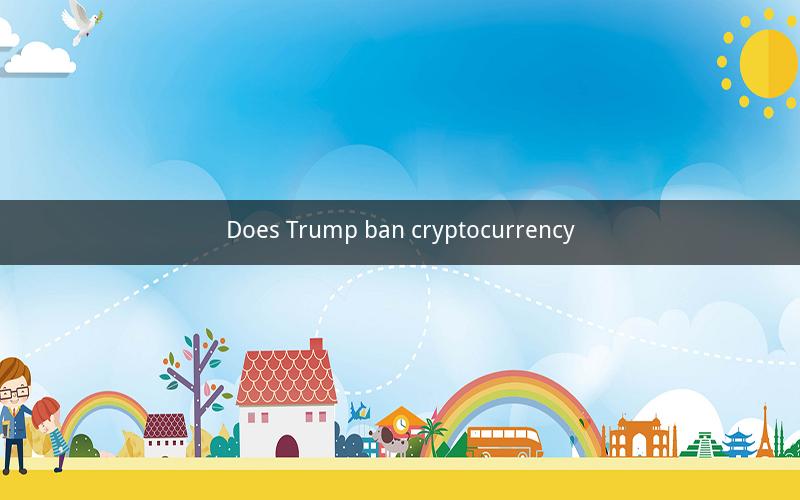
Does Trump Ban Cryptocurrency?
Table of Contents
1. Introduction to Cryptocurrency
2. Background of Trump's Presidency
3. Cryptocurrency Regulation during Trump's Era
4. Trump's Stance on Cryptocurrency
5. Potential Reasons for Not Banning Cryptocurrency
6. Cryptocurrency Regulation after Trump's Presidency
7. Conclusion
1. Introduction to Cryptocurrency
Cryptocurrency, a digital or virtual form of currency, has gained immense popularity in recent years. It operates independently of any central bank and relies on a decentralized system, known as blockchain, for secure transactions. Bitcoin, the first and most well-known cryptocurrency, was created in 2009, and since then, thousands of other cryptocurrencies have emerged.
2. Background of Trump's Presidency
Donald Trump served as the 45th President of the United States from January 20, 2017, to January 20, 2021. His presidency was marked by several significant economic and policy changes, including tax reforms, trade negotiations, and immigration policies.
3. Cryptocurrency Regulation during Trump's Era
During Trump's presidency, the U.S. government and regulatory agencies grappled with the rapid growth of cryptocurrency. The Financial Crimes Enforcement Network (FinCEN) and the Securities and Exchange Commission (SEC) were among the key regulatory bodies overseeing the cryptocurrency industry.
4. Trump's Stance on Cryptocurrency
Throughout his presidency, Trump's stance on cryptocurrency was ambiguous. While he did not explicitly ban cryptocurrency, he expressed concerns about its potential for illegal activities and its lack of regulation. In several interviews and public statements, Trump highlighted the risks associated with cryptocurrencies, such as money laundering and the financing of terrorism.
5. Potential Reasons for Not Banning Cryptocurrency
Despite the concerns raised by Trump and other government officials, there were several reasons why a ban on cryptocurrency may not have been implemented during his presidency:
- Economic Growth: Cryptocurrency has the potential to drive innovation and economic growth, especially in the financial sector.
- Market Demand: The increasing popularity of cryptocurrency among investors and businesses indicates a growing demand for digital assets.
- International Competition: Banning cryptocurrency could put the U.S. at a disadvantage compared to other countries that have embraced digital currencies.
6. Cryptocurrency Regulation after Trump's Presidency
Since Trump's presidency, the U.S. government has continued to regulate the cryptocurrency industry. The Biden administration has emphasized the need for clear and comprehensive regulations to protect consumers and prevent financial crimes. The SEC has been particularly active in this area, investigating numerous cryptocurrency exchanges and ICOs.
7. Conclusion
While President Trump did not ban cryptocurrency during his presidency, his administration expressed concerns about its potential risks and lack of regulation. The U.S. government has continued to grapple with the challenges posed by the rapid growth of cryptocurrency, aiming to strike a balance between innovation and consumer protection.
Questions and Answers
1. Q: What is cryptocurrency?
A: Cryptocurrency is a digital or virtual form of currency that operates independently of any central bank and relies on a decentralized system, known as blockchain, for secure transactions.
2. Q: When was Bitcoin created?
A: Bitcoin was created in 2009.
3. Q: What is the main advantage of cryptocurrency over traditional currency?
A: The main advantage of cryptocurrency is its decentralized nature, which allows for secure transactions without the need for intermediaries like banks.
4. Q: Why did President Trump express concerns about cryptocurrency?
A: President Trump expressed concerns about the potential for illegal activities, such as money laundering and the financing of terrorism, associated with cryptocurrency.
5. Q: What are the main regulatory agencies overseeing the cryptocurrency industry?
A: The main regulatory agencies overseeing the cryptocurrency industry are the Financial Crimes Enforcement Network (FinCEN) and the Securities and Exchange Commission (SEC).
6. Q: What are the potential economic benefits of cryptocurrency?
A: The potential economic benefits of cryptocurrency include driving innovation, reducing transaction costs, and fostering financial inclusion.
7. Q: Why might the U.S. government be hesitant to ban cryptocurrency?
A: The U.S. government might be hesitant to ban cryptocurrency due to its potential for economic growth, market demand, and international competition.
8. Q: How has the SEC been involved in regulating cryptocurrency?
A: The SEC has been actively investigating cryptocurrency exchanges and ICOs, aiming to protect investors and prevent financial crimes.
9. Q: What are the main concerns regarding cryptocurrency regulation?
A: The main concerns regarding cryptocurrency regulation include protecting consumers, preventing financial crimes, and ensuring market stability.
10. Q: How has the Biden administration approached cryptocurrency regulation?
A: The Biden administration has emphasized the need for clear and comprehensive regulations to protect consumers and prevent financial crimes in the cryptocurrency industry.